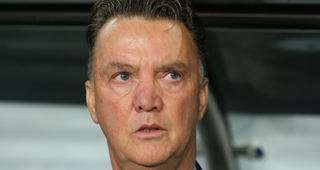In terms of narrative relevance in the English Premier League this season, Manchester United comfortably ranks last in that top-7 flotilla.
Chelsea has had their wire-to-wire run intermixed with José Mourinho’s usual media provocation games.
Manchester City has been a toothless No. 2 in danger of finishing behind rebuilding United one year after winning the league.
Southampton has been the little club that could after selling off so much of their team last summer, making their system all the more menacing to rich club hegemony in the long-term.
Arsene Wenger needing to retire and then somehow salvaging a top-4 finish for Arsenal is an annual tradition unlike any other.
Harry Kane came from nowhere to become a goal-wrecker and give Mauricio Pochettino a fighting chance to finish ahead of his former club in his first season at Tottenham.
Liverpool was entirely incapable of replacing Luis Suárez until Brendan Rodgers saved their season and his job by switching to a 3-4-3 before they returned to crisis.
It was easy to write off United early in the season when they lost to Swansea City in the EPL opener, drew with Sunderland and Burnley, lost to Leicester City, along with a 4-0 loss to M.K. Dons in the League Cup mixed in between.
Three months into the job, Van Gaal already began planting seeds in the media that he would need three years to fix United; that the issues would need a lot more work to remedy than he realized in his initial swashbuckling assessment. He still may not be wrong.
The fact that Marouane Fellaini, Juan Mata and Ander Herrera have keyed United’s surge during this difficult run of fixtures since losing to Swansea City in February triggers David Moyes’ revisionist history and that money will always carry more currency than a well-considered plan. Van Gaal had the luxury of stepping into the expectations after Moyes instead of the expectations after Sir Alex Ferguson, but he has more importantly managed to fail better than Moyes.
Fellaini and Mata represented the ineffectiveness of Moyes’ signings during his lone season, while Herrera was targeted by him during the 2013 summer transfer window. Athletic Bilbao waited a year before selling Herrera to United for €36 million and Louis van Gaal waited until February to begin starting him. In February, Van Gaal was openly pining for the summer when he could sign a creative midfielder before realizing he already had one ready to make an enormous impact. Van Gaal deserves credit on some level for Herrera, but it was hardly a purposeful and discerning play on his part and it’s doubtful he realized he had the best all-around center midfielder in the EPL sitting right there.
United has operated this season from their confidence in David de Gea in goal, which allows them to conservatively and patiently keep possession and strike strategically, turning expected goal maps upside down all season and allowing Van Gaal to experiment in front of him. United are at the top of the EPL in possession and pass success (along with City), but United ranks just eighth in shot attempts. They’re not attacking aggressively and have been called “Long-Ball United.” United is able to keep their work in progress defense from being exposed despite playing so many attacking players because of this conservative strategy.
Even in their impressive and hugely consequential win at Liverpool last month, they were more opportunistic with Mata’s two goals than they were attacking at will.
United has gained 11 points over last season after 31 matches, which is easily the best progress of last year’s top-7 and they have similarly outspent their rivals. Van Gaal has been more of a tinkering genius than tactical one this season, shifting from a 3-5-2 to a 4-4-2 diamond formation before settling into the 4-3-3. Van Gaal touts his ‘flexibility’ as a manager and that really has keyed their success. Sometimes it is better to be a ‘flexible genius’ than a ‘mad genius’.
United is outperforming expectations while getting very little or nothing at all out of Robin van Persie, Radamel Falcao and Angel di Maria. It has instead come from the players who were written off as Moyes’ leftovers in the summer and Michael Carrick again being a no-stats All-Star with his remarkable on/off record. Only clubs that have spent as much as United could survive with such little returns on investment.
United also of course benefits from not playing in Europe all season, just as Liverpool did the previous season when they jumped from 7th to 2nd. The best way to get back to the top-4 when you fall out realistically is to make sure you fall all the way out to seventh and dodge the Europa League. It is the EPL’s version of tanking to avoid the mediocrity treadmill of the NBA.
Everton has been eaten alive in the EPL while competing in the Europa League and will probably drop from 5th in 13-14 to outside the top-10.
At this point, United are clearly far from a finished product capable of challenging for the EPL next season, but this current run of form is also not an aberration as their 10-match unbeaten streak from Nov. 2 at City until their Jan. 11 loss to Southampton proved to be. The fixtures get tougher with City, Chelsea and Everton coming in the next three weekends, but there is a lot of breathing room between United and Liverpool, Spurs and Southampton and there’s been a dependability to their performances that suggest a level of sustainability.
A top-4 finish was not expected by anyone other than the most optimistic Van Gaal believers and it makes doing business in the summer infinitely easier. Mats Hummels, who has been the most frequently mentioned top United target over the past year, will be missing out on the Champions League with Dortmund and that level of play becomes available to him with a transfer. When shopping for the types of players United wants, that’s pivotal and it means they won’t have to grossly overpay as they did for Di Maria.
The EPL is an overrated league in many respects but the balance in quality makes it a unique and compelling one. The new $7.84 billion television deal will likely cause the EPL to have even more competitive balance and significant jumps and falls of their blueblood clubs like United has seen over the past three seasons. United won the league in what became Ferguson’s final season with a flawed roster that became exposed and fell apart completely in the next under Moyes before this reconfigured return to a second, third or fourth spot.
The United narrative isn’t as compelling or inspiring as those other clubs, but it shows that it’s almost always better to be rich than good.



